Ahh, is there any greater joy in life than snuggling into bed at the end of the day? Nope. And when it comes to what we snuggle into, we all like something different. According to a recent study, 45% of our participants chose their favourite bedding as soft and smooth fabric as their number one priority. The question is, what fabric is the softest to give you the best night’s sleep? Let’s explore some of the most popular fabrics and help you get comfy.
What are the most popular fabrics for bedding?
When it comes to choosing your bedding online, you may get overwhelmed with all the options. And not being able to reach out and touch the fabric can make it harder to know what is going to feel best. If you love your bedding soft and smooth, here are the most popular fabrics to get wrapped in and how they fare on the softness scale.

Cotton
How soft and smooth is cotton?
Cotton is one of the most popular, well-known options for bedding. Organic cotton is best for breathability, and the fabric is also moisture-wicking and durable. Cotton thread count is important, with higher thread counts resulting in a softer fabric though coming with a higher price tag. Not all cotton bedding will feel ultra-soft. It depends on the quality, and not all cotton is organic. This depends on the production process, so shop carefully when you are opting for cotton and remember the higher the thread count, the softer the fabric. Egyptian cotton has the softest reputation in the land of cotton for being handpicked, while regular cotton is machine picked, which can affect the quality of the yarn.
Linen
How soft and smooth is linen?
Linen is another popular choice for bedtime, though the fabric tends to have a reputation for being rough and scratchy. Natural linen can actually feel incredibly soft, and you want to know something unique about this fabric? It actually gets softer with every wash. Another way to soften up linen is to blend it with softer fabrics like bamboo. This is how we make our Bamboo and French linen bed sheets which provide a unique textured feel. When shopping for linen, read reviews and ensure the production process is chemical-free to ensure you are purchasing the highest quality fabric.
Bamboo
How soft and smooth is bamboo?
Bamboo is a rising superstar in the land of bedtime and has fast become a snuggling favourite. The natural fabric is made from the wonder plant bamboo, one of the world’s most sustainable resources. The fabric is ultra-soft and smooth (softer than Egyptian cotton) and highly breathable, moisture-wicking and hypoallergenic. Bamboo fabric is popular with sensitive skin and those suffering from common conditions like eczema or allergies. The gentle fabric glides over the skin for the softest, smoothest nights. The supreme softness also makes our bamboo great for kids’ skin.

Our bamboo is subject to the highest environmental standards, and our production process ensures our fabric is chemical free. Once you experience our 100% Bamboo Bedding, we doubt you’ll want to switch your sheets again. And you don’t have to. The thermoregulating fabric will keep you snoozin’ through the warmest summers and cosy in chilly winters.
Sateen
How soft and smooth is sateen?
Sateen is known for its buttery-like softness, making it another popular choice of fabric. It is made from treated fibres of the cotton plant before being woven into a satin weave. This fabric can feel a little more slippery than soft and does not have the same breathability and moisture-wicking properties as other fabrics. Due to the way it drapes closely to the body, sateen tends to retain heat, which makes it less popular with hot sleepers and summer bedding. However, this tends to be more affordable and is often adored for its shiny finish.
What is the softest fabric of them all for bedtime?
Drum roll… Our winner for the softest, smoothest bedtime fabric has to be bamboo. Bamboo is softer than Egyptian cotton whilst being thermoregulating, hypoallergenic and incredibly breathable, making it perfect for every sleeper. Bamboo pulp is derived from the plant, ripened and woven into bamboo viscose, the fabric used to create the softest bedding. And guess what? Bamboo bedding gets softer with every wash, keeping bedtime fresh and ready for snuggling all year round. Our bamboo bedding comes with a comfy 30-night home trial and a five-year guarantee so you can get wrapped up in magic without losing a wink of sleep.
Bamboo is also the best choice for our beautiful planet, another reason to snuggle soundly. Check out our beddings range of dreamy colours, from vintage pink to midnight blue- find your favourite and make bedtime perfect.
Sweet Dreams
FAQs
1. What makes a fabric soft?
The softness of a fabric is determined by several factors, including the type of fibre used, the weave of the fabric, and the thread count. Natural fibres like cotton, silk, and bamboo are inherently soft to the touch.
2. How do I choose the right fabric for my bedding?
Choosing the right fabric for your bedding depends on personal preferences, your climate, and any skin sensitivities you might have.
3. What are the top fabrics recommended for soft and smooth bedding?
The top fabrics for soft and smooth bedding include Egyptian cotton, known for its long fibres and luxurious feel; silk, which offers an unparalleled smoothness and temperature regulation; bamboo, appreciated for its softness and eco-friendly properties; and microfiber, which provides a cost-effective yet soft alternative to more traditional fabrics.
4. How can I maintain the softness of my bedding over time?
Follow the care instructions provided by the manufacturer to maintain the softness of your bedding. Hand washing your bedding in cool water and drying it on a low setting can help preserve fabric softness. Avoid harsh detergents or fabric softeners, as these can break down the fibres over time.
5. Are there any eco-friendly soft bedding options?
Yes, there are several eco-friendly options for those seeking soft bedding. Bamboo bedding is one of the eco-friendly options, as bamboo is a highly renewable resource that requires minimal water and no pesticides to grow.
6. How do thread count and weave affect fabric softness?
Thread count and weave are significant factors in determining fabric softness. A higher thread count usually means the fabric will be softer, indicating a tighter weave with more threads per square inch.
7. What is the best fabric for duvet covers?
Bamboo duvet covers are considered the best option for their exceptional softness, durability, and eco-friendly qualities. They offer a silky smooth texture that is comfortable in warm and cool temperatures, thanks to their natural breathability and moisture-wicking properties.

![[MattressTopper] Panda London Memory Foam Bamboo Mattress Topper package box](http://pandalondon.com/cdn/shop/files/Bamboo_Mattress_Topper_Package_Box.webp?v=1742301823&width=1500)
![[MattressTopper] Panda London Memory Foam Bamboo Mattress Topper on the floor](http://pandalondon.com/cdn/shop/products/Panda-Memory-Foam-Bamboo-Mattress-Topper-Yoga-e1624045454555.jpg?v=1758795458&width=1000)
![[MattressTopper] Bamboo Mattress Topper Lifestyle Image with Memory Foam Pillows Product Page](http://pandalondon.com/cdn/shop/files/Bamboo_Mattress_Topper_Lifestyle_Image_with_Memory_Foam_Pillows_Product_Page.webp?v=1758795458&width=800)
![[MattressTopper] Bamboo Mattress Topper Lifestyle Image with Bamboo Pillows In the Garden room Product Page](http://pandalondon.com/cdn/shop/files/Bamboo_Mattress_Topper_Lifestyle_Image_with_Bamboo_Pillows_In_the_Garden_room_Product_Page.webp?v=1758795458&width=800)
![[MattressTopper] Panda London Memory Foam Bamboo Mattress Topper side](http://pandalondon.com/cdn/shop/files/Mattress_Topper_Isolated_-_resized.jpg?v=1758795458&width=800)
![[HybridMattressPro] Hybrid_Bamboo_Mattress_Pro_Product_Image_2026](http://pandalondon.com/cdn/shop/files/Hybrid_Bamboo_Mattress_Pro_Product_Image_2026.webp?v=1764944771&width=1000)
![[HybridMattressPro] Breathable Hybrid Bamboo Mattress](http://pandalondon.com/cdn/shop/products/Breathable-Hybrid-Bamboo-Mattress.jpg?v=1764944771&width=1920)
![[HybridMattressPro] Hybrid Bamboo Mattress Pro Cover Zip](http://pandalondon.com/cdn/shop/files/Hybrid_Bamboo_Mattress_Cover.jpg?v=1764944771&width=800)
![[HybridMattressPro] Panda Hybrid Bamboo Mattress Pro](http://pandalondon.com/cdn/shop/files/Hybrid_Bambo_Memory_Foam_Mattress_-_BioCell_Foam_x.jpg?v=1764944771&width=800)
![[HybridMattressPro] Couple on a Hybrid Bamboo Mattress Pro](http://pandalondon.com/cdn/shop/files/Hybrid_Bamboo_Mattress_Couple.jpg?v=1764944771&width=800)
![[CloudDuvet] Panda London The Cloud Bamboo Duvet Packaging](http://pandalondon.com/cdn/shop/products/Panda-London-The-Cloud-Bamboo-Duvet-Panda-Life-scaled_00a651ad-4ca3-4105-b520-12a94c1a4f71.jpg?v=1713363286&width=1920)
![[CloudDuvet] Panda London The Cloud Bamboo Duvet Rolled](http://pandalondon.com/cdn/shop/products/Duvet-Listing-Images03.jpg?v=1764079307&width=1000)
![[CloudDuvet] Panda London The Cloud Bamboo Duvet Girl Huggin a Duvet on the Bed](http://pandalondon.com/cdn/shop/files/Cloud_Bamboo_Duvet_-_Lady_Hugging_it_on_Bed_LifestyleImage.jpg?v=1764079307&width=1000)
![[CloudDuvet] Panda London The Cloud Bamboo Duvet Guy In the Air with Cloud Bamboo Duvet](http://pandalondon.com/cdn/shop/files/GuyonaHybridBambooMattresswithCloudDuvet.jpg?v=1764079307&width=2000)
![[CloudDuvet] Panda Cloud Duvet Winter on the bed lifestyle image](http://pandalondon.com/cdn/shop/files/Panda_Cloud_Duvet_Winter_on_the_Bed_Lifestyle-1_image.jpg?v=1764079307&width=1000)
![[BBWhite] White 100% Bamboo Bedding](http://pandalondon.com/cdn/shop/files/Pure_White_Full_Bed.webp?v=1719581797&width=1000)
![[BBWhite] White 100% Bamboo Bedding Texture](http://pandalondon.com/cdn/shop/files/100_Bamboo_Bedding_-_Pure_White_-_Close_Up_02.webp?v=1762879591&width=1000)
![[BBWhite] White 100% Bamboo Bedding Woman in bed sleeping](http://pandalondon.com/cdn/shop/files/100-Bamboo-Bedding-Set-Pure-White-BB.webp?v=1762879591&width=768)
![[BBWhite] White 100% Bamboo Bedding Woman Duvet cover buttons](http://pandalondon.com/cdn/shop/files/hand_and_buttons_1.webp?v=1762879591&width=1000)
![[BBWhite] White 100% Bamboo Bedding Woman in bed looking and smiling-](http://pandalondon.com/cdn/shop/files/SatonMadeBed-White100_BambooBedding-white_-_BB_SideShot1000x1000.webp?v=1762879591&width=980)
![[BBUrbanGrey] Urban Grey 100% Bamboo Bedding](http://pandalondon.com/cdn/shop/files/Made_Bed_-_Urban_Grey_-_Wide_Shot_2_1_1.webp?v=1762880019&width=1000)
![[BBUrbanGrey] Cloud Duvet Urban Grey 100% Bamboo Bedding Set](http://pandalondon.com/cdn/shop/files/Cloud_Duvet_-_Grey_-_Close_up_2.webp?v=1762880019&width=1000)
![[BBUrbanGrey] Urban Grey 100% Bamboo Bedding Set Woman sitting on the bed](http://pandalondon.com/cdn/shop/files/Sat_in_Bed_-_Grey_100__Bamboo_Bedding_-_Wide_Shot.webp?v=1762880019&width=1000)
![[BBUrbanGrey] Urban Grey 100% Bamboo Bedding Set Woman Duvet buttons Panda London](http://pandalondon.com/cdn/shop/files/hand_buttons_grey_bedding_1.webp?v=1762880019&width=1000)
![[BBUrbanGrey] Woman Sitting on the Bamboo Bedding with coffee](http://pandalondon.com/cdn/shop/files/SatonMadeBed-White100_BambooBedding-SideShot1000x1000.jpg?v=1762880019&width=1000)
![[BBNavyBlue] Deep Sea Navy Blue 100% Bamboo Bedding](http://pandalondon.com/cdn/shop/files/Made_Bed_-_Navy_-_Wide_Shot_3_copy.webp?v=1762879591&width=1000)
![[BBNavyBlue] Deep Sea Navy Blue 100% Bamboo Bedding Texture](http://pandalondon.com/cdn/shop/files/Cloud_Duvet_-_Navy_-_Close_up_2.webp?v=1762880019&width=1000)
![[BBNavyBlue] Deep Sea Navy Blue 100% Bamboo Bedding Woman Sitting on the bed](http://pandalondon.com/cdn/shop/files/Sat_Up_in_Bed_-_Navy_100__Bamboo_Bedding_-_Hands_on_Bed.webp?v=1762880019&width=1000)
![[BBNavyBlue] Deep Sea Navy Blue 100% Bamboo Bedding Duvet Cover Buttons](http://pandalondon.com/cdn/shop/files/Cloud_Duvet_Cover_Buttons_-_Deep_Sea_Navy.webp?v=1762880019&width=1000)
![[BBNavyBlue] Deep Sea Navy Blue 100% Bamboo Bedding Woman sitting on the bed looking away](http://pandalondon.com/cdn/shop/files/SatonMadeBed-White100_BambooBedding-SideShot1000x1000-001.webp?v=1762880019&width=980)
![[BBPink] Vintage Pink Blue 100% Bamboo Bedding](http://pandalondon.com/cdn/shop/files/Made_Bed_-_Pink_-_Wide_Shot_copy.webp?v=1762879591&width=1000)
![[BBPink] Vintage Pink Texture 100% Bamboo Bedding](http://pandalondon.com/cdn/shop/files/Cloud_Duvet_-_Pink_-_Close_up_2.webp?v=1762880019&width=1000)
![[BBPink] Vintage Pink Woman Sitting on the 100% Bamboo Bedding](http://pandalondon.com/cdn/shop/files/Sat_Up_in_Bed_-_Pink_-_Hands_on_Bed.webp?v=1762880019&width=1000)
![[BBPink] Vintage Pink Woman Sitting on the 100% Bamboo Bedding Duvet Cover](http://pandalondon.com/cdn/shop/files/Cloud_Duvet_Cover_Buttons_-_Vintage_Pink.webp?v=1762880019&width=1000)
![[BBPink] Vintage Pink Woman Sitting on the 100% Bamboo Bedding Woman looking far away](http://pandalondon.com/cdn/shop/files/SatonMadeBed-White100_BambooBedding-SideShot1000x1000-001_Vintage_Pink.webp?v=1762880019&width=980)
![[BBGrey] Light Grey 100% Bamboo Bedding](http://pandalondon.com/cdn/shop/files/Made_Bedding_in_Bedroom_-_Urban_Grey_-_Wide_Shot.webp?v=1762879591&width=1000)
![[BBGrey] Light Grey 100% Bamboo Bedding texture](http://pandalondon.com/cdn/shop/files/Texture17.webp?v=1762880019&width=1000)
![[BBGrey] Light Grey 100% Bamboo Bedding with Woman smiling](http://pandalondon.com/cdn/shop/files/Sat_Up_in_Bed_-_Grey_-_Hands_on_Bed.webp?v=1762880019&width=1000)
![[BBGrey] Light Grey 100% Bamboo Bedding with Duvet Cover buttons](http://pandalondon.com/cdn/shop/files/Cloud_Duvet_Cover_Buttons_-_Quiet_Grey.webp?v=1762880019&width=1000)
![[BBGrey] Light Grey 100% Bamboo Bedding with Woman smiling and sitting coffee](http://pandalondon.com/cdn/shop/files/SatonMadeBed-White100_BambooBedding-SideShot1000x1000-002-_Grey.webp?v=1762880019&width=980)
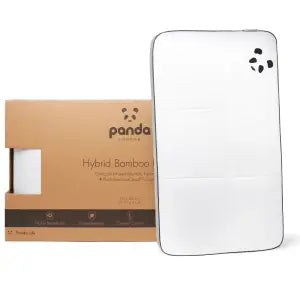 Hybrid Bamboo Pillow
Hybrid Bamboo Pillow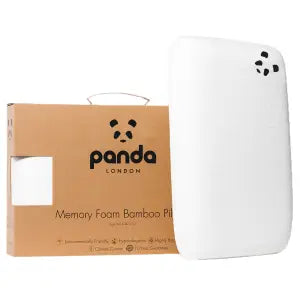 Memory Foam Bamboo Pillow
Memory Foam Bamboo Pillow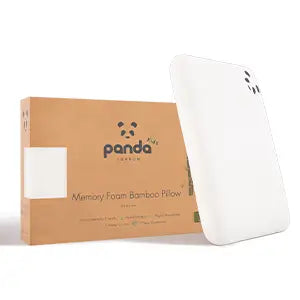 Kids Memory Foam Bamboo Pillow
Kids Memory Foam Bamboo Pillow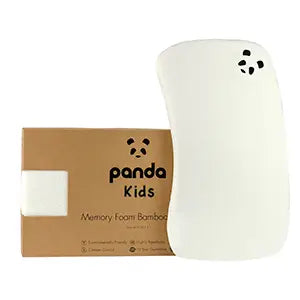 Baby Memory Foam Bamboo Pillow
Baby Memory Foam Bamboo Pillow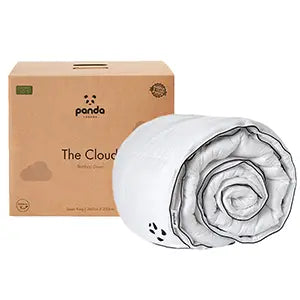 Panda Cloud Duvet
Panda Cloud Duvet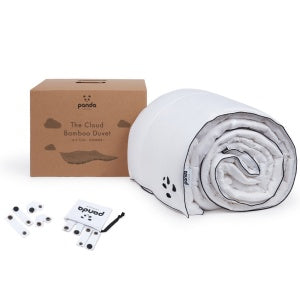 Bamboo Summer Duvet
Bamboo Summer Duvet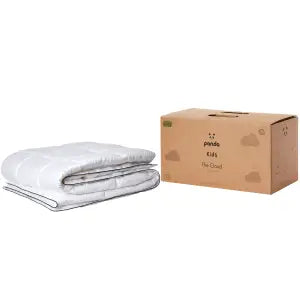 Kids Cloud Duvet
Kids Cloud Duvet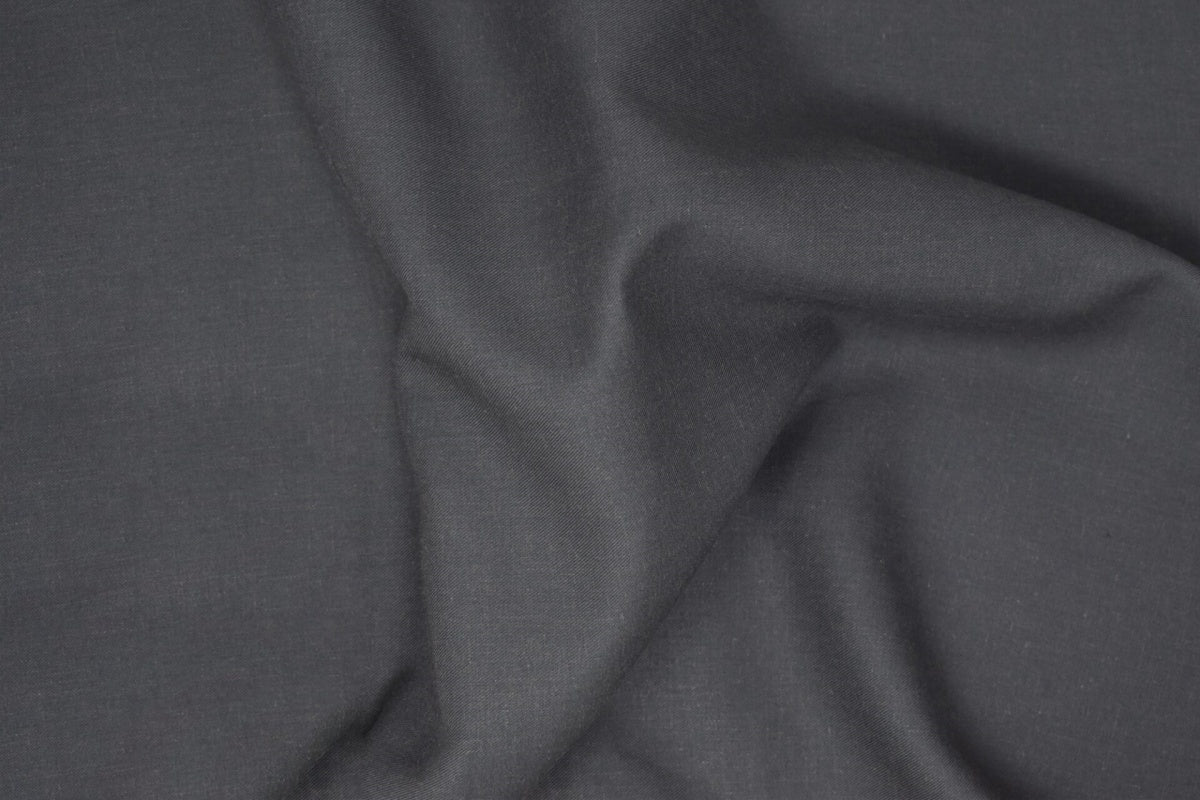
![[ForestGreen] Panda London Bamboo Lyocell Bedding Set Package](http://pandalondon.com/cdn/shop/files/Bamboo_Lyocell_Bedding_Set_Package.jpg?v=1713800411&width=768)
![[ForestGreen] Panda London Bamboo Lyocell Texture](http://pandalondon.com/cdn/shop/files/Green-Texture.jpg?v=1713800527&width=768)
![[ForestGreen] Bamboo Lyocell Green Corner Panda London](http://pandalondon.com/cdn/shop/files/GreenPCCorner.jpg?v=1713800525&width=768)
![[ForestGreen] Bamboo Lyocell Green Buttons Panda London](http://pandalondon.com/cdn/shop/files/BambooLyocellButtonsGreen.jpg?v=1713800525&width=768)
![[ForestGreen] Panda London Bamboo Lyocell Green Fitted Sheet](http://pandalondon.com/cdn/shop/files/Green_Fitted_Sheet.jpg?v=1713800503&width=768)
![[ForestGreen] Panda London Complete Bamboo Lyocell Bedding Set](http://pandalondon.com/cdn/shop/files/GreenBedding-FullSet.jpg?v=1713800527&width=768)
![[Cream] Panda London Bamboo Lyocell Full Bedding Set](http://pandalondon.com/cdn/shop/files/Bamboo_Lyocell_Bedding_Set_Package_Cream.jpg?v=1713800626&width=768)
![[Cream] Panda London Bamboo Lyocell Cream Texture](http://pandalondon.com/cdn/shop/files/PebbleCream-Texture.jpg?v=1713800973&width=768)
![[Cream] Panda London Bamboo Lyocell Full Bedding Set Cream Corner](http://pandalondon.com/cdn/shop/files/PebbleCreamPCCorner.jpg?v=1713800973&width=768)
![[Cream] Panda London Bamboo Lyocell Full Bedding Panda Bamboo button](http://pandalondon.com/cdn/shop/files/PebbleCreamButton.jpg?v=1713800973&width=768)
![[Cream] Panda London Bamboo Lyocell Full Bedding Fitted Sheet](http://pandalondon.com/cdn/shop/files/PebbleCreamFittedSheet.jpg?v=1713800973&width=768)
![[Cream] Panda London Bamboo Lyocell Full Bedding Set Lifestyle Image](http://pandalondon.com/cdn/shop/files/PebbleCreamBedding-FullSet.jpg?v=1713800973&width=768)
![[all] Bamboo Mattress Protector Package - PandaLondon](http://pandalondon.com/cdn/shop/files/Bamboo_Mattress_Protector_-_Packaging_Image_-_White_Background.webp?v=1721139172&width=1900)
![[all] Bamboo Mattress Protector for Hybrid Bamboo Mattress](http://pandalondon.com/cdn/shop/files/Bamboo_Mattress_Protector_New.webp?v=1721138562&width=1000)
![[all] Book on a Bamboo Mattress Protector](http://pandalondon.com/cdn/shop/products/Mattress-Protector-Listing-Images02.jpg?v=1721139189&width=1500)
![[all] Bamboo Mattress Protector Corner](http://pandalondon.com/cdn/shop/products/Mattress-Protector-Listing-Images03-e1623787734812.jpg?v=1721139189&width=1300)
![[all] Bamboo Mattress Protector Corner in line Panda London](http://pandalondon.com/cdn/shop/products/Mattress-Protector-Listing-Images04.jpg?v=1721139183&width=1500)
![[all] Panda Bamboo Mattress Protector Panda London](http://pandalondon.com/cdn/shop/files/Panda-Bamboo-Mattress-Protector-Guarantee-768x768_jpg_450393f5-91a9-499f-b15a-12d636a9a8b7.webp?v=1721139183&width=768)
